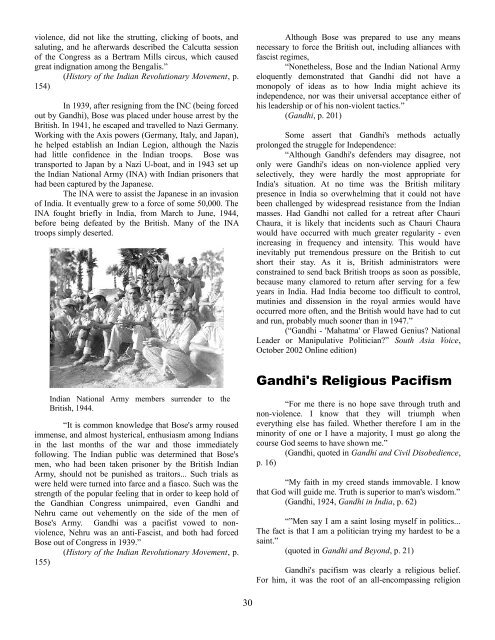Smash Pacifism - Warrior Publications
Smash Pacifism - Warrior Publications
Smash Pacifism - Warrior Publications
Create successful ePaper yourself
Turn your PDF publications into a flip-book with our unique Google optimized e-Paper software.
violence, did not like the strutting, clicking of boots, and<br />
saluting, and he afterwards described the Calcutta session<br />
of the Congress as a Bertram Mills circus, which caused<br />
great indignation among the Bengalis.”<br />
(History of the Indian Revolutionary Movement, p.<br />
154)<br />
In 1939, after resigning from the INC (being forced<br />
out by Gandhi), Bose was placed under house arrest by the<br />
British. In 1941, he escaped and travelled to Nazi Germany.<br />
Working with the Axis powers (Germany, Italy, and Japan),<br />
he helped establish an Indian Legion, although the Nazis<br />
had little confidence in the Indian troops. Bose was<br />
transported to Japan by a Nazi U-boat, and in 1943 set up<br />
the Indian National Army (INA) with Indian prisoners that<br />
had been captured by the Japanese.<br />
The INA were to assist the Japanese in an invasion<br />
of India. It eventually grew to a force of some 50,000. The<br />
INA fought briefly in India, from March to June, 1944,<br />
before being defeated by the British. Many of the INA<br />
troops simply deserted.<br />
Indian National Army members surrender to the<br />
British, 1944.<br />
“It is common knowledge that Bose's army roused<br />
immense, and almost hysterical, enthusiasm among Indians<br />
in the last months of the war and those immediately<br />
following. The Indian public was determined that Bose's<br />
men, who had been taken prisoner by the British Indian<br />
Army, should not be punished as traitors... Such trials as<br />
were held were turned into farce and a fiasco. Such was the<br />
strength of the popular feeling that in order to keep hold of<br />
the Gandhian Congress unimpaired, even Gandhi and<br />
Nehru came out vehemently on the side of the men of<br />
Bose's Army. Gandhi was a pacifist vowed to nonviolence,<br />
Nehru was an anti-Fascist, and both had forced<br />
Bose out of Congress in 1939.”<br />
(History of the Indian Revolutionary Movement, p.<br />
155)<br />
30<br />
Although Bose was prepared to use any means<br />
necessary to force the British out, including alliances with<br />
fascist regimes,<br />
“Nonetheless, Bose and the Indian National Army<br />
eloquently demonstrated that Gandhi did not have a<br />
monopoly of ideas as to how India might achieve its<br />
independence, nor was their universal acceptance either of<br />
his leadership or of his non-violent tactics.”<br />
(Gandhi, p. 201)<br />
Some assert that Gandhi's methods actually<br />
prolonged the struggle for Independence:<br />
“Although Gandhi's defenders may disagree, not<br />
only were Gandhi's ideas on non-violence applied very<br />
selectively, they were hardly the most appropriate for<br />
India's situation. At no time was the British military<br />
presence in India so overwhelming that it could not have<br />
been challenged by widespread resistance from the Indian<br />
masses. Had Gandhi not called for a retreat after Chauri<br />
Chaura, it is likely that incidents such as Chauri Chaura<br />
would have occurred with much greater regularity - even<br />
increasing in frequency and intensity. This would have<br />
inevitably put tremendous pressure on the British to cut<br />
short their stay. As it is, British administrators were<br />
constrained to send back British troops as soon as possible,<br />
because many clamored to return after serving for a few<br />
years in India. Had India become too difficult to control,<br />
mutinies and dissension in the royal armies would have<br />
occurred more often, and the British would have had to cut<br />
and run, probably much sooner than in 1947.”<br />
(“Gandhi - 'Mahatma' or Flawed Genius? National<br />
Leader or Manipulative Politician?” South Asia Voice,<br />
October 2002 Online edition)<br />
Gandhi's Religious <strong>Pacifism</strong><br />
“For me there is no hope save through truth and<br />
non-violence. I know that they will triumph when<br />
everything else has failed. Whether therefore I am in the<br />
minority of one or I have a majority, I must go along the<br />
course God seems to have shown me.”<br />
(Gandhi, quoted in Gandhi and Civil Disobedience,<br />
p. 16)<br />
“My faith in my creed stands immovable. I know<br />
that God will guide me. Truth is superior to man's wisdom.”<br />
(Gandhi, 1924, Gandhi in India, p. 62)<br />
“”Men say I am a saint losing myself in politics...<br />
The fact is that I am a politician trying my hardest to be a<br />
saint.”<br />
(quoted in Gandhi and Beyond, p. 21)<br />
Gandhi's pacifism was clearly a religious belief.<br />
For him, it was the root of an all-encompassing religion


